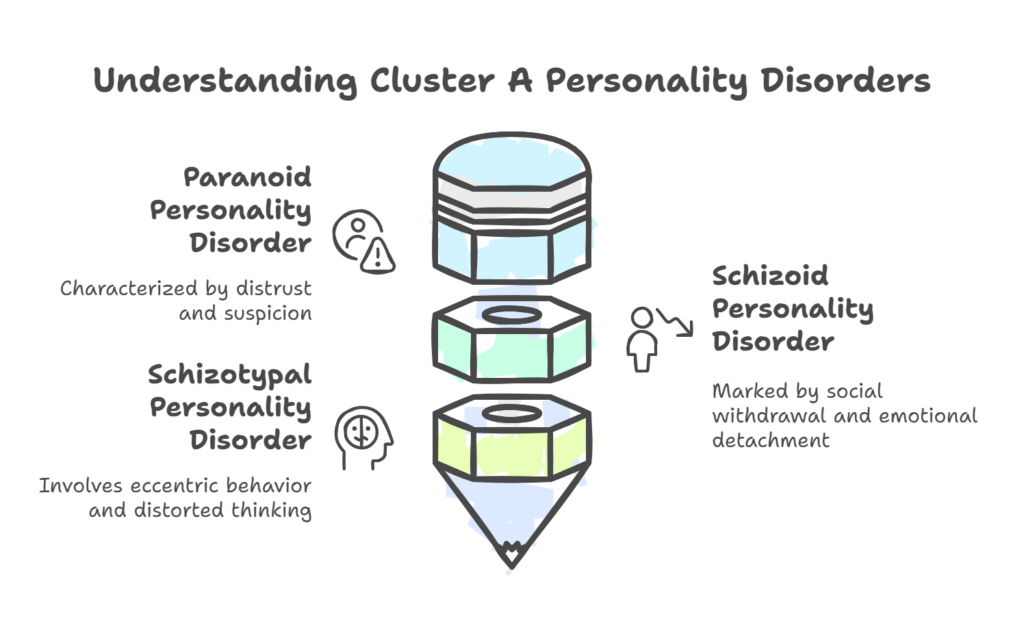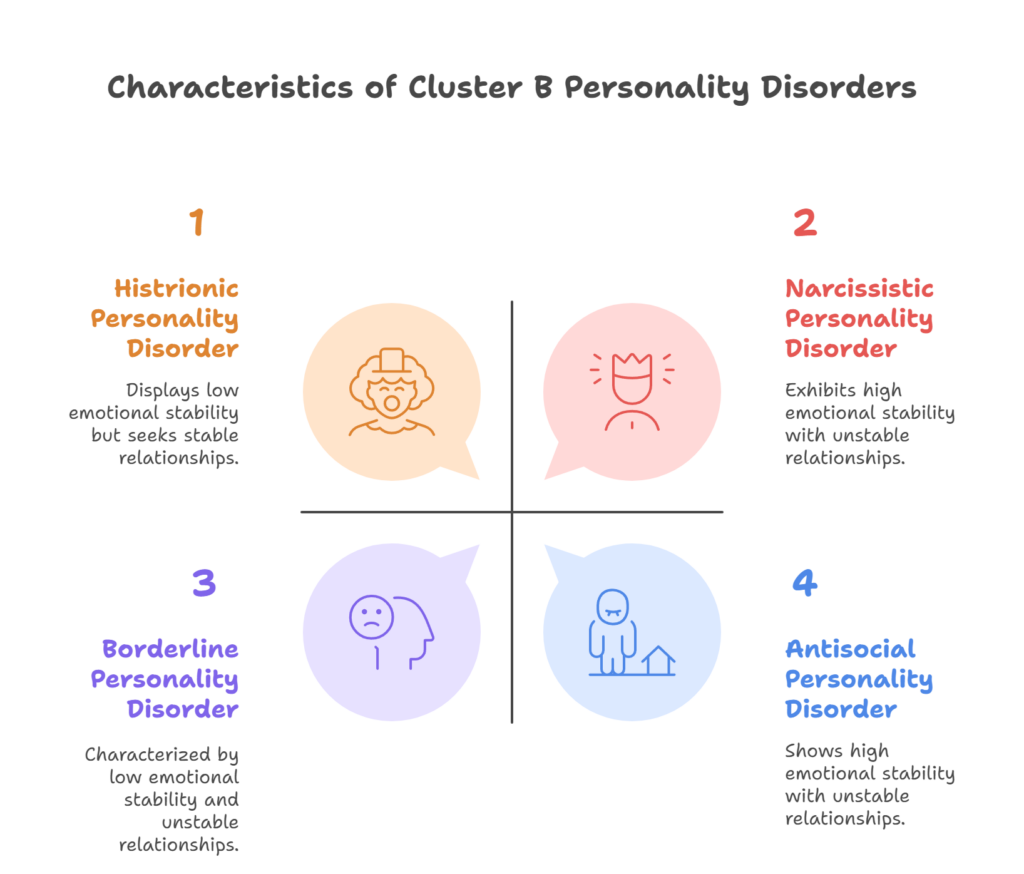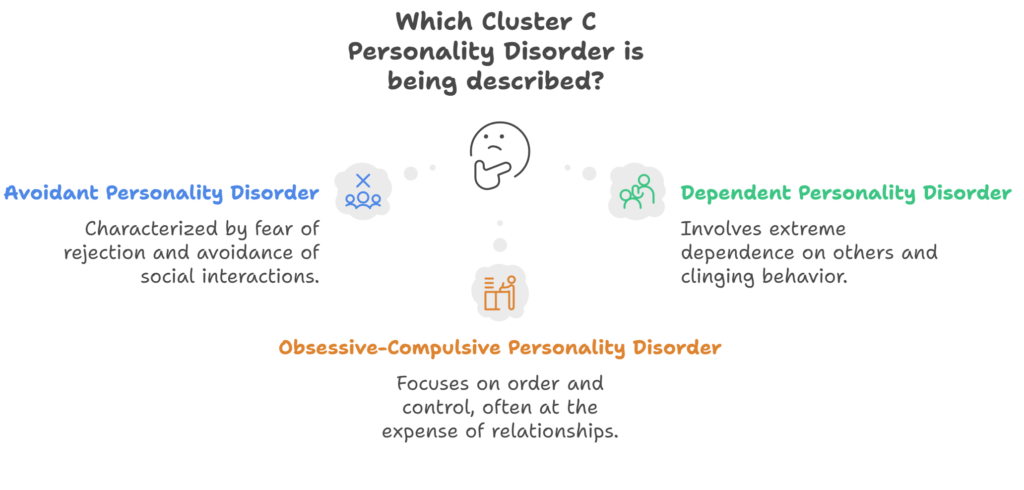The Impact of personality disorders can be intense, not only for those who have them but also for their loved ones. Living with Cluster A, B, and C personality disorders affects how a person thinks, feels, and interacts with others, often leading to struggles in relationships, work, and daily life. If you or someone close to you faces these challenges, understanding these disorders may be the first step to reclaiming control and stability. It’s essential to act early.
Let’s dive into what each personality disorder cluster really means and why getting help now can make a huge difference.
Personality disorders are conditions where someone’s long-term patterns of behavior, thoughts, and feelings diverge significantly from what society might expect, making everyday situations harder to manage. Approximately 9% of U.S. adults have a diagnosable personality disorder, impacting their daily lives and relationships
Personality disorders are grouped into three broad categories, or clusters, based on similar symptoms:
Understanding the specific symptoms within each cluster can be a lifeline for those affected, providing clarity and motivation for seeking help.
Cluster A personality disorders are defined by odd, eccentric behavior that makes forming close relationships challenging. This can lead to isolation, and without support, daily life becomes even harder to navigate.

Here are the main types of Cluster A personality disorders:
Cluster A personality disorders can create a cycle of isolation, making it crucial to reach out for support to regain a sense of connection and normalcy.
Cluster B personality disorders are marked by intense emotions and dramatic, sometimes impulsive actions. Relationships, stability, and self-image can suffer significantly without intervention.

Individuals with Cluster B personality disorders may feel misunderstood or overwhelmed by their emotions, but reaching out now could open doors to more stable, fulfilling relationships and personal growth.
Cluster C personality disorders are defined by feelings of anxiety and fear that may affect almost every decision and relationship in a person’s life.

For those with Cluster C personality disorders, fear, and anxiety can be paralyzing. Seeking help now can provide immediate relief and start a journey toward a more balanced, enjoyable life.
Here’s a quick look at the general symptoms that span across Cluster A, B, and C personality disorders:
Personality disorders can powerfully affect quality of life and well-being. Early support is key, and with the right guidance, many people find significant improvement.
The exact causes of Cluster A, B, and C personality disorders are still being researched, but several risk factors can play a role:
Being aware of these risk factors helps individuals and families take preventative measures or get timely treatment, especially if symptoms begin to appear.
The good news? Personality disorders are treatable, and many individuals find relief and stability through a blend of therapies and support.
A well-rounded treatment plan usually includes the following:
Without treatment, these disorders can worsen, impacting relationships and personal well-being. Seeking professional help now can make all the difference, allowing for a healthier, more balanced life.
Q: What are Cluster A, B, and C personality disorders?
A: Cluster A, B, and C personality disorders are mental health conditions grouped by characteristics. Cluster A includes odd or eccentric behaviors, Cluster B involves dramatic or emotional behaviors, and Cluster C includes anxious or fearful behaviors.
Q: What is the hardest mental illness to live with?
A: Living with any mental illness can be challenging, but borderline personality disorder (BPD) and schizophrenia are often considered particularly difficult due to intense emotional instability, identity struggles, and disrupted relationships, significantly impacting quality of life.
Q: Is BPD hard to live with?
A: Yes, borderline personality disorder (BPD) can be challenging due to intense mood swings, fear of abandonment, and impulsivity. It affects relationships and daily functioning, making life especially hard without proper support and treatment.
Q: Are Cluster C personality disorders curable?
A: Cluster C personality disorders are not curable, but with therapy and support, individuals can manage symptoms effectively, leading to a more balanced and fulfilling life. Treatment like Cognitive Behavioral Therapy (CBT) helps address fears and anxieties.
For those dealing with the daily struggles of Cluster A, B, and C personality disorders, support from an experienced team is vital. Relevance Recovery offers specialized programs designed to address these disorders with compassion, personalized care, and effective treatments. Reaching out is not just an option. It’s a way to transform the future.
Cluster A, B, and C personality disorders can deeply impact lives, but with the right help, the journey to better mental health is possible. Don’t wait. There are options that can improve well-being and positively impact relationships, self-image, and quality of life. Relevance Recovery is here to provide expert guidance and dedicated support, helping individuals navigate these complex disorders and regain control.